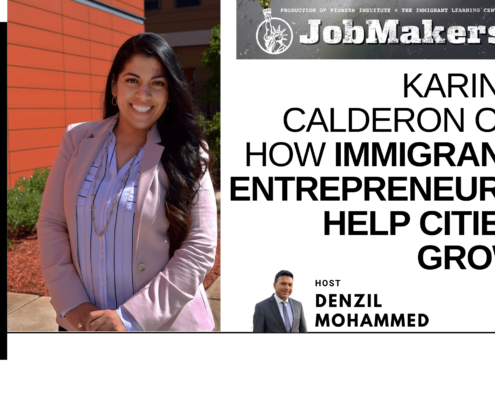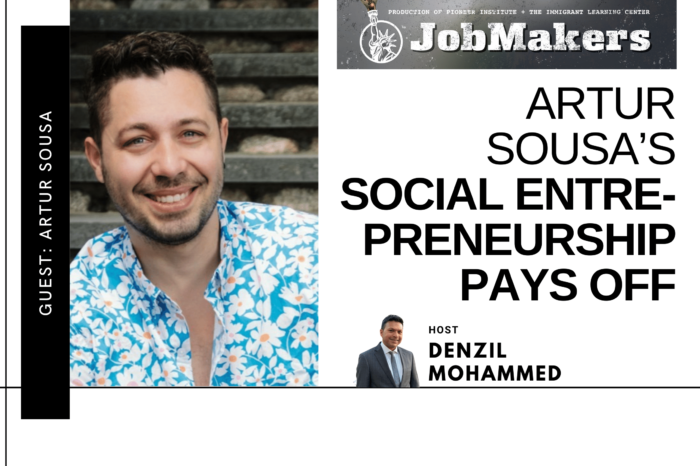Artur Sousa’s Social Entrepreneurship Pays Off
/in Economic Opportunity, Featured, JobMakers /by Editorial StaffThis week on JobMakers, host Denzil Mohammed talks with Artur Sousa, immigrant from Brazil and founder and CEO of Adopets, an online platform that simplifies the work done by shelters and improves the pet adoption experience. Adopets has over 40,000 registered users and maintains more than 300,000 adoption listings. In this week’s JobMakers, Artur describes how opportunity, capitalism, circumstance and a rescue pup successfully aligned to fuel his social entrepreneurship success; though he is keenly aware that not every immigrant shares in the American Dream.
Guest:
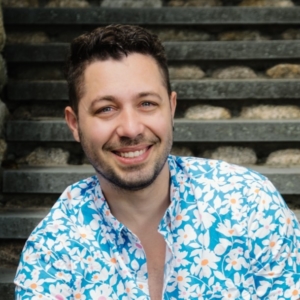 Artur Sousa is the Founder and CEO of Adopets, a Techstars-backed company that is transforming the operational efficiency of animal shelters around the world. He has 16+ experience in corporate strategy, technology, and start-ups; has lived in Japan, Sweden, Brazil, and the United States; and is a recipient of a United Nations MDG Award and a member of the Brazil-based Royal Academy of Arts & Music. He earned a Master’s degree from Hult International Business School.
Artur Sousa is the Founder and CEO of Adopets, a Techstars-backed company that is transforming the operational efficiency of animal shelters around the world. He has 16+ experience in corporate strategy, technology, and start-ups; has lived in Japan, Sweden, Brazil, and the United States; and is a recipient of a United Nations MDG Award and a member of the Brazil-based Royal Academy of Arts & Music. He earned a Master’s degree from Hult International Business School.
Get new episodes of JobMakers in your inbox!
Read a Transcript of This Episode
Please excuse typos.
Denzil Mohammed:
I’m Denzil Mohammed and welcome to Jobmakers.
Denzil Mohammed:
What is social entrepreneurship? According to the us chamber of commerce, social on entrepreneurship is the process by which individuals, startups and entrepreneurs develop and fund solutions that directly address social issues. A social entrepreneur, therefore is a person who explores business opportunities that have a positive impact on their community in society or the world. For Artur Sousa, immigrant from Brazil and founder and CEO of Adopets, a pet adoption platform that simplifies the work done by shelters and improves the pet adoption experience, fixing problems and doing good in the world is his business model. Unnecessary bureaucracy in the adoption process led him to create a platform that today has more than 40,000 registered users and maintains more than 300,000 adoption listings. Artur is a problem solver and his series of businesses and technologies have proven that, but he’s keenly aware of the factors that enabled him to succeed in the United States that not every immigrant experiences, the American dream, as he says, is not always fair to everyone. He shares with us how opportunity capitalism circumstance and a rescue pet successfully aligned in this week’s Jobmakers. Artur Sousa, founder and CEO of Adopets, welcome to Jobmakers. How are you?
Artur Sousa:
I am good. Thanks for having me. It’s such a pleasure.
Denzil Mohammed:
So tell me a little bit about your business. It’s very unique, right?
Artur Sousa:
I would like to think so. We chose to begin our journey within the pet adoption space. Basically we started because my wife and I decided to adopt a pet. We saw quite a few bureaucratic pieces of the adoption process that were very manual, very paper heavy at that point and we thought that we could be of help. I’ve always been involved in technology in one way or another and thought that we could maybe help out an organization that we have been working with. And once we did it, it became a little bit more of a thing and was like, well, maybe it can actually be a system that can serve in general, not just a little side project for our organization that we were supporting. And then with that in mind, Adopets was born at that point.
Artur Sousa:
Our focus really is on optimizing the adoption experience. The way we present ourselves is as a shelter animal shelter that is, but shelter efficiency platform. So we are focusing really on the flow of their visitors all the way through meeting animals, through adopting animals, submitting their interests to those animals, signing contracts, paying adoption fees and so on and so on. So it really covers the entire spectrum of the adoption process, whether it is a actual animal shelter with the animals right there in a building or a foster based rescue with animals spread around volunteer houses and so on.
Denzil Mohammed:
I see. So you’ve encountered a problem and you decided to fix it. And out of that, a perfectly beautiful business was born. And this is not your first business either, is it?
Artur Sousa:
No, it isn’t, I’ve been a little obsessed with it, fixing things. <Laugh> tell me more about that. I think if I look back and that’s not an observation that I do often, but when I look back to our business journey it has always been in that same context, what problem that annoyed me and that I thought maybe I could fix and that I had a specific type of passion for the outcome. So if I look at the very, very first one when we were working, I was working with a nonprofit, a very large, no profit in Brazil and the way we were project managing the projects that was very inefficient. We had a really large staff, mostly volunteers to run the operations for the organization. So I decided to optimize that through a series of process-driven platforms.
Artur Sousa:
And that very first project created a whole other universe in my mind and journey and career then because we just reduced their general staffing, 95%, but we doubled the outcome from an impact wise just by being professionally organized. And that kind of triggered me each of the social impact area of things. And I was just wanting to what if we could do something, but we have some money in return. And that makes us do even more. And then it just makes this scalable model. I didn’t know what that was, social entrepreneurship at the time, mind you, but it ended up being what, let me led me to actually, to the us to get a master’s in social entrepreneurship much later than that, but eventually was a cause.
Denzil Mohammed:
So take us back to you’ve mentioned Brazil and that’s where you were born. Paint us a picture. What was life like back in Brazil when you were growing up
Artur Sousa:
Back home? I never really spent more than a year in one place. Right? So from a financial standpoint was always moving to a new place. I had never, until college, I had never spent more than a year in the same school cuz we would move and go to a new place cuz you know mom couldn’t always afford rent and then we had to go into a new place there. You know, there are many struggles in the world and I don’t don’t think mine was the worst there could be. But it had an impact. It had an impact in which, you know, I’ve actually gotten used to never settling and always keep moving and from place to place in, in Brazil, just college, I spent in five different universities across five different states, just transferring when I would get bored and go to a new place. Cause it really gets you used to that movement. You, you get, you know, as a defense mechanism that, oh, got I’m done with this place. I gotta go to a new one. So anyway, I think at Brazil was, it’s still the place that I need to go to recharge my soul when I feel empty.
Denzil Mohammed:
Wow. That’s, that’s quite incredible. And the idea of, of constantly moving, obviously move to the US, which was a huge move. You said you did that to further your education and career. What was the experience like when you first moved here?
Artur Sousa:
It was weird at first I was very excited, but it was well, I, I didn’t have, especially with the, with the foreign exchange coming from Brazil I didn’t have all the funds that would require for comfortable stay during a masters and it was a full-time master’s degree. So it wasn’t like I could be working. I wouldn’t be able to work either away from a visa standpoint if I could. So I came with my suitcase and stayed the, for my master’s at first was really weird to not fully understand the language. I had gotten enough that I had the, the grades for qualification from an English standpoint, but because I studied very, very hard, not because I actually had mastered the language. So at first a lot of the things in classes, I would understand a lot more by context because I had been working for a long time, not by the, the textbookor, or the teachers, but that lasted for a couple months. I had made a hard decision to not actually be with any Brazilian friends while in the US. So would only hang out with English to speaking once, cuz would force me to be more comfortable with the language and that really over time.
Denzil Mohammed:
I can’t imagine going to do a master’s degree without having mastered the language that you were going to do that degree in. I mean, that must have been a really, you said weird, but it must been a struggle those first few months. What motivates you most of all? Is it fixing problems and making, you know, just things easier for people
Artur Sousa:
That is one of the things I think fixing problems is just on, on my personality to point that I’m, I keep doing new things over time. Cuz once my business gets a point of stability and more, you know, bureaucratic arrangement from a corporate standpoint, it’s not for me anymore. So I like to be in the mass and fixing things. That’s one big part of my personality, but the, the other part is one Bo just a funny story. Actually, I had a boss in, in Boston that I loved and he, he was very, very good to me. And his still a good friend and he, one day he told him like that I was fundamentally unmanageable. I really like, and I took that as a, as a one of my biggest compliments in life. Mind you because I, I don’t, I, I like thing, I like things that I can fix. I like going and experimenting and, and getting it wrong and breaking things and I’m fixing them again and seeing the best path for it. And in that sense, I don’t always, or have never, quite frankly, fit to a box in which I would just do the predetermined things that have been assigned to me. I always go beyond and, and entrepreneurship is the best place for that.
Denzil Mohammed:
So as a social entrepreneur and a serial entrepreneur, talk us through the start of your current business, you mentioned that it was a bureaucratic problem that you wanted to so all, but get us into the, sort of the nuts and bolts of the Genesis of the business,
Artur Sousa:
The application process to adopt a pet varies from organization to organization, from state to state city to city. It all varies quite a bit. But it’s overall a, a time consuming paper process that relies on a lot of really loving, caring animal people that are behind those organizations, usually underpaid if paid at all helping animals that don’t always have the time to do the process in a, in the most efficient way. When you’re looking at a, an adoption individual, we might be talking about, you know, few hours off time, if you put together what the staff’s time and the adopter’s time to get the adoption concluded doesn’t sound out that much. But when you go to other organizations who have a partner, for instance, in New Zealand, that process is 40,000 adoptions a year. So if you have a couple of hours that you’re taking away from 40,000, you’re thinking 80,000 hours away just by using a system that simplifies it and takes the process to a more automatic approach of triggering communications and so on.
Artur Sousa:
You’re basically saving so much time that gives you the ability to save more animals. So that was the behind the efficiency there. What we had to focus on was like, all right, so how do we make this? From a monetization standpoint and from a scalability standpoint, a practical answer. And it took a while for the majority of the time that I was built, not majority anymore, but for the first two years of APAs, I was building that while having a job. And at that point we already had 70 members in the, in the organization, but I was still with my day job on, on, on, on the side until 2018 when I quit. And then I quit in 2018, we moved up to Maine and then my entire focus at me being on the business. And that’s when we really focused on scale.
Artur Sousa:
And I kept saying on the blessing side, cuz I believe that there’s gotta be some universe plan now there, because, you know, should the tra tragedy that pandemic was for society as a whole. If I can’t put a pin on that side for a minute, the pandemic for the business really propelled it. Because when the pandemic hit, they didn’t have a choice. They needed to go online and nobody had been doing that at all. And we were right there. We were ready to go, we were ready there. Society was not from a using digital tools for the adoption of animals. And then it caught up and then we were right in the, in the right place at the right time. And
Denzil Mohammed:
You were perfectly positioned to, to, to deal with this pandemic and the fact that everyone wanted to have pets, all of a sudden
Artur Sousa:
Fair,
Denzil Mohammed:
Give us the number what’s, what’s the impact that your businesses have has had over the years.
Artur Sousa:
Ooh. So last year alone, we had 70,000 adoptions going through the system. We are serving clients in Australia, in New Zealand, in the, in Canada and the us haven’t gone into Brazil quite yet. Still a goal. We had about at any given time, about 70 to a hundred thousand animals available for adoption through or platform in majority of the us states in there. And I will send you a note after discomplete, cuz it’s still confidential, but we are about to go into a really big change in, in the coming weeks with another partner in the, in the space,
Denzil Mohammed:
The United States is sort of inherently entrepreneurial. I mean, we it’s, it was built on that kind of spirit. And I like to say that immigrants themselves are inherently on, on entrepreneurial because they take a risk. They don’t know if it’s gonna be better or worse. They pack a suitcase, leave everything they know behind and, and start fresh in some place. New. What do you think makes the United States special when it comes to being a business owner, an entrepreneur,
Artur Sousa:
The American dream story, right? That was built as a story first. It actually is a realistic approach that can be taking it is still an unfair approach, you know, depending on your race, depending on your origins, depending on your language is not fair to all how the American dream plays out. I, I say this in a very sad way. I am white in the sense that if I don’t speak, people don’t even know that I’m a foreign. They don’t even guess that I’m a foreigner and it’s a horrible thing, but that plays out in the us plays out positively because of how the society is, why around the us. So I had many opportunities that came because I wasn’t really facing a biased approach prior to it. I had to make some changes. We were just joking before the call about that, but I would never send an email as Artur.
Artur Sousa:
I would always send an email as Arthur, but putting all of that aside, there is an opportunity. There is an opportunity where entrepreneurship is actually highly glorified in the US, that taking risks is actually a mundane thing. It’s not a, this when you’re born in a Catholic country, heavily Catholic country is, you know, we wanna have that little routine and you have the most stable job and the things. And the west is not so much about that as I believe some of the Hispanic countries or Latino countries like my own culturally and we are all about that pursuing the dream and that’s powerful whether or not we get to realize it, whether or not it gets materialized for most people is that source of the debate. And we can talk about that forever, but the pursuit of the dream really drives people.
Artur Sousa:
The idea of coming here and giving her all because of that really well told American dream story actually gets you. Places is very little of, because of the American dream, but a lot more because of your effort, in my opinion, and because you are pursuing it, you’re pursuing the idea of it. So you’re building your dream, not necessarily because the society is built out in a way that helps you get there. Cause let’s be honest, it doesn’t right finding funding depending on your color, depending on your race, depending where you’re from. It is very different now if you are, and I’m sorry if I’m being too direct about this then. So but if you are, you know, a white kid that graduated at MIT, you get funding like this, you get funding with an idea before getting anything. Now, if you are a Latino entrepreneur or an African up origin entrepreneur or a black entrepreneur you actually get, or even middle eastern entrepreneurs too, like you have a lot more hoops to navigate through.
Artur Sousa:
There are many funds that have been popping out. There are more focused on diversity and other things, but that’s still a minority consider compared to other venture capital funds and other things. So the, the, the pursuit has to be what driving you, because it’s not really the, the context that is getting you there is you really not dropping it, not giving up on it. And I think in immigrants in general are very good at that because they already gave up all they knew coming here. So there is no choice. There is no going back at that point, you’re just is either make it or make it
Denzil Mohammed:
There’s, there’s no safety net. There’s nothing to fall back on there. You don’t have your parents house to, to crash in. If, if you enter a bad patch, you just, you have to make it work. What, regardless of, of what you encounter. And I really appreciate the very nuanced and detailed way you painted the pursuit of the American dream and how it’s different for different people. A lot of people like to ignore that these facts, that it is harder for some people based on very superficial things. I wanna pull it back a little a bit. We did some research in the greater Boston area and found that Brazilian immigrants from Brazil had the highest rate of self-employment up to 27% of Brazilians in greater greater Boston said they were self-employed. This is incorporated and not incorporated businesses were what’s. What is with that? What is, what is it about Brazilians and starting businesses?
Artur Sousa:
When I think about Latino entrepreneurs in general, not just Brazilian, we usually are talking about really resourceful people that, that really make things happen, you know, in a McGuyver way before they are there. And you’re just improvising and, and getting it there because of your drive. I think Latinos are very driven people generally on, on being better to their families, to themselves.
Denzil Mohammed:
I am happy that you are here in the us. I’m happy that you are making positive changes. I’m happy that you are creating jobs. You’re currently employed 33 people and to date you’ve hundreds. So you are a job creator. You are an indispensable member of our community, and thank you for creating jobs and, and being innovative.
Artur Sousa:
Very kind of you. And thank you for having me here. Thank you for the work you do on bringing you know, immigrants to the spotlight. So we all are more comfortable with the contributions that immigrants build in this, in the country and how much we are actually a country of immigrants all together, building this together.
Denzil Mohammed:
Artur Sousa, founder, CEO of Adopets thank you so much for joining us on the Jobmakers podcast.
Artur Sousa:
Thank you for having me. And if I can be of any help turn anyone out there, let me know.
Denzil Mohammed:
Jobmakers is a weekly podcast about immigrant entrepreneurship and contribution produced by Pioneer Institute, a think tank in Boston and the Immigrant Learning Center in Malden, Massachusetts, a not-for-profit that gives immigrants of voice. Thank you for joining us for this week’s powerful story of immigrant entrepreneurship. Remember, you can subscribe to Jobmakers on apple podcasts, Spotify, or wherever you get your podcasts. And please leave us a rating and a review I’m Denzil Mohammed. See you next Thursday at noon for another Jobmakers.
Recent Episodes:
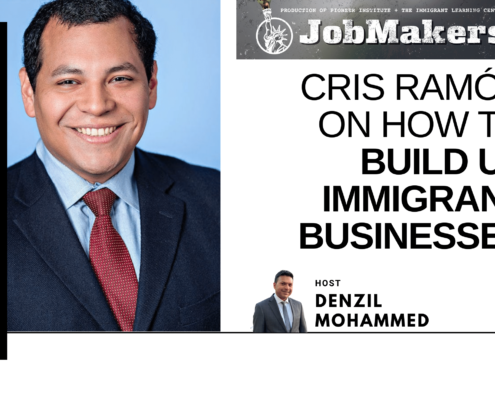
Cris Ramón on How to Build Up Immigrant Businesses
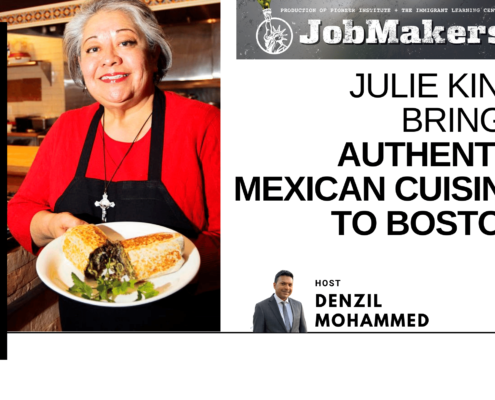
Julie King Brings Authentic Mexican Cuisine to Boston
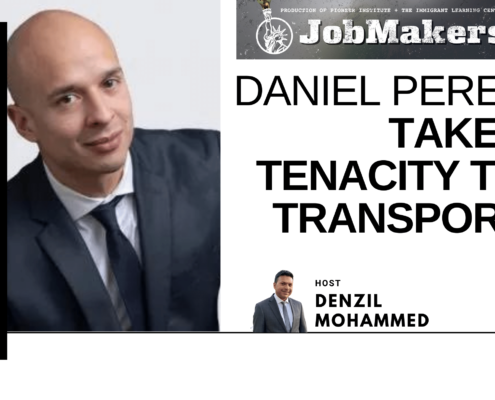
Daniel Perez Takes Tenacity to Transport
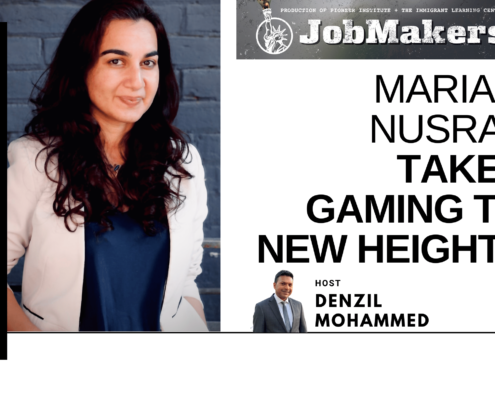
Mariam Nusrat Takes Gaming to New Heights
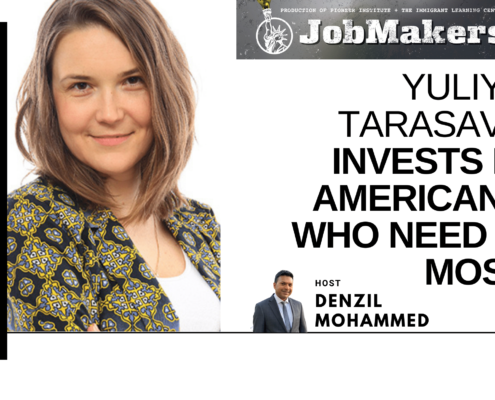
Yuliya Tarasava Invests In Americans Who Need It Most
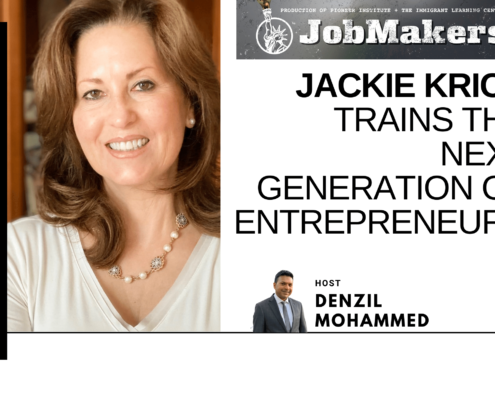
Jackie Krick Trains the Next Generation of Entrepreneurs
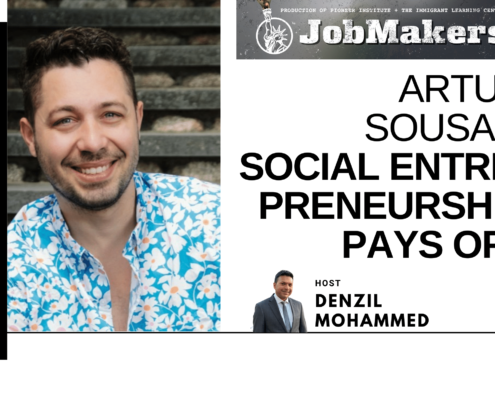
Artur Sousa’s Social Entrepreneurship Pays Off
